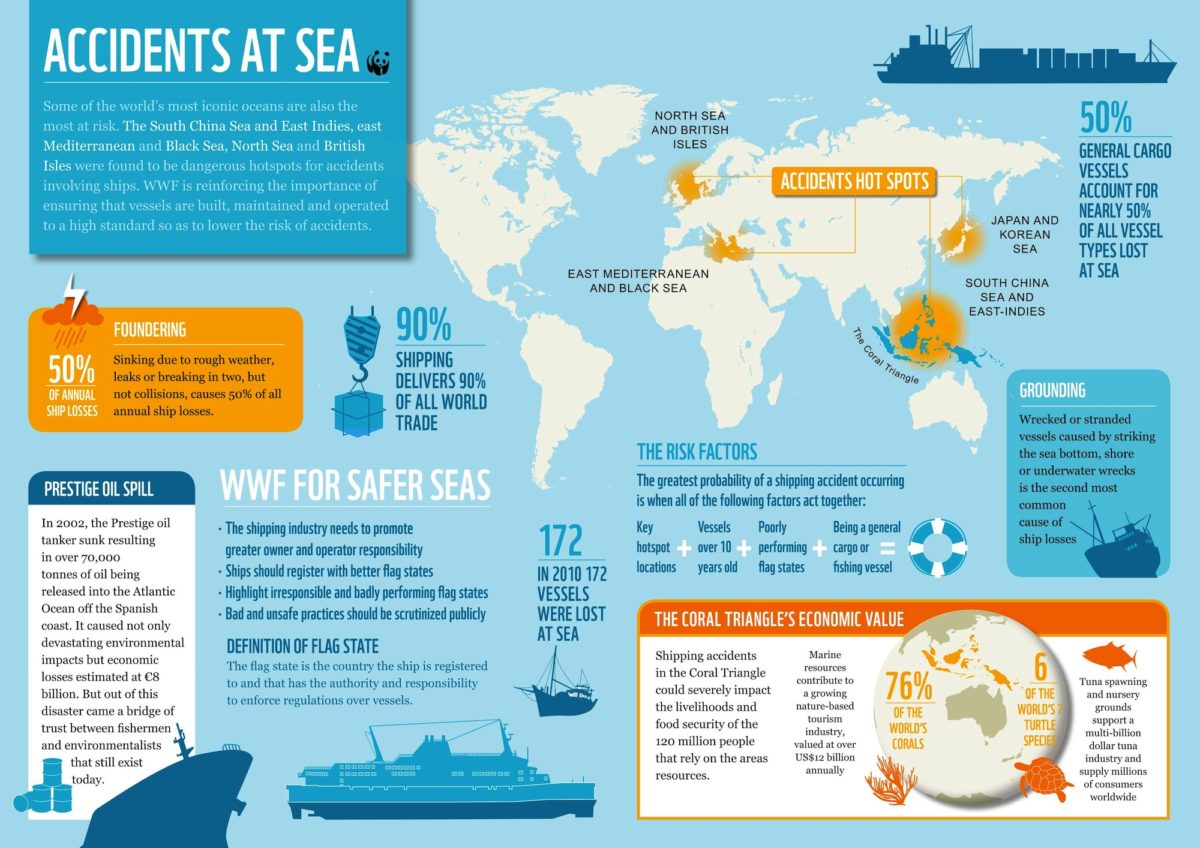Photo Shows Dutch Cargo Vessel Aground in the Canadian Arctic as Salvage Effort Looms
The Dutch-flagged 21,359-dwt general cargo vessel Thamesborg remains aground along the Northwest Passage in the Canadian Arctic four days after hitting a shoal.

Accidents at Sea infographic. Click image to enlarge.
The South China Sea and East Indies, east Mediterranean and Black Sea, North Sea and British Isles are the world’s most dangerous hotspots for accidents involving ships, according to a recently released study on maritime shipping accidents conducted by the World Wildlife Fund, one of the world’s largest independent conservation organizations.
The study focuses on factors that have contributed to, or have been associated with, shipping accidents that have occurred over the last 15 years. WWF says that it is the first of its kind to be independently commissioned.
“Since 1999 there have been 293 shipping accidents in the South China Sea and East Indies, home of the Coral Triangle and 76 percent of the world’s coral species.” said Dr Simon Walmsley, Marine Manager, WWF International. “As recently as April this year we`ve seen a Chinese fishing boat run aground on a protected coral reef in the Philippines that had already been damaged by a US Navy ship in January.”
According to the study, rightfully titled Accidents at Sea, fishing vessels accounted for nearly one quarter of all vessels lost, but general cargo ships accounted for over 40 percent. The study notes that general cargo ships often operate on short shipping routes associated with tramp trading, where ships are without a set route and pick up opportunistic trade, particularly in Southeast Asia.
The risk to the environment is directly linked to the type and amount of hazardous substances, including oil, being transported and the sensitivity of the marine area where any accident could occur, the study found.
In 2002, the Prestige oil tanker sunk resulting in over 70,000 tonnes of oil being released into the Atlantic Ocean off the Spanish coast.
“The Prestige oil spill caused not only environmental impacts but economic losses estimated at €8 billion. Even small scale accidents in very sensitive environments, like the Great Barrier Reef, can have profound environmental consequences.” said Dr Walmsley.
Climate change models also show increased storm surges, changing wind and wave patterns and extreme weather events are likely to exacerbate the risks of foundering, which can lead to potential catastrophic environmental destruction. According to the study, 50 percent of all accidents are caused by foundering, or the sinking of the vessel from a loss of stability.
As the global fleet continues to expand rapidly and begins to operate routinely in more risky areas, the probability of accidents and likely severity of impacts will also increase unless precautionary measures are put in place to address identifiable risk factors, the WWF says.
“We really want to see the shipping industry promote greater owner and operator responsibility and encourage owners to register with better flag states, the country which a vessel is registered to.”
“Additionally, irresponsible and badly performing owners and countries need to be exposed in order to motivate them to significantly increase their standards which will decrease the number of accidents we see still occurring today” said Dr Walmsley.
Download: Accidents at Sea Report Summary

Sign up for gCaptain’s newsletter and never miss an update

Subscribe to gCaptain Daily and stay informed with the latest global maritime and offshore news


Stay informed with the latest maritime and offshore news, delivered daily straight to your inbox
Essential news coupled with the finest maritime content sourced from across the globe.
Sign Up